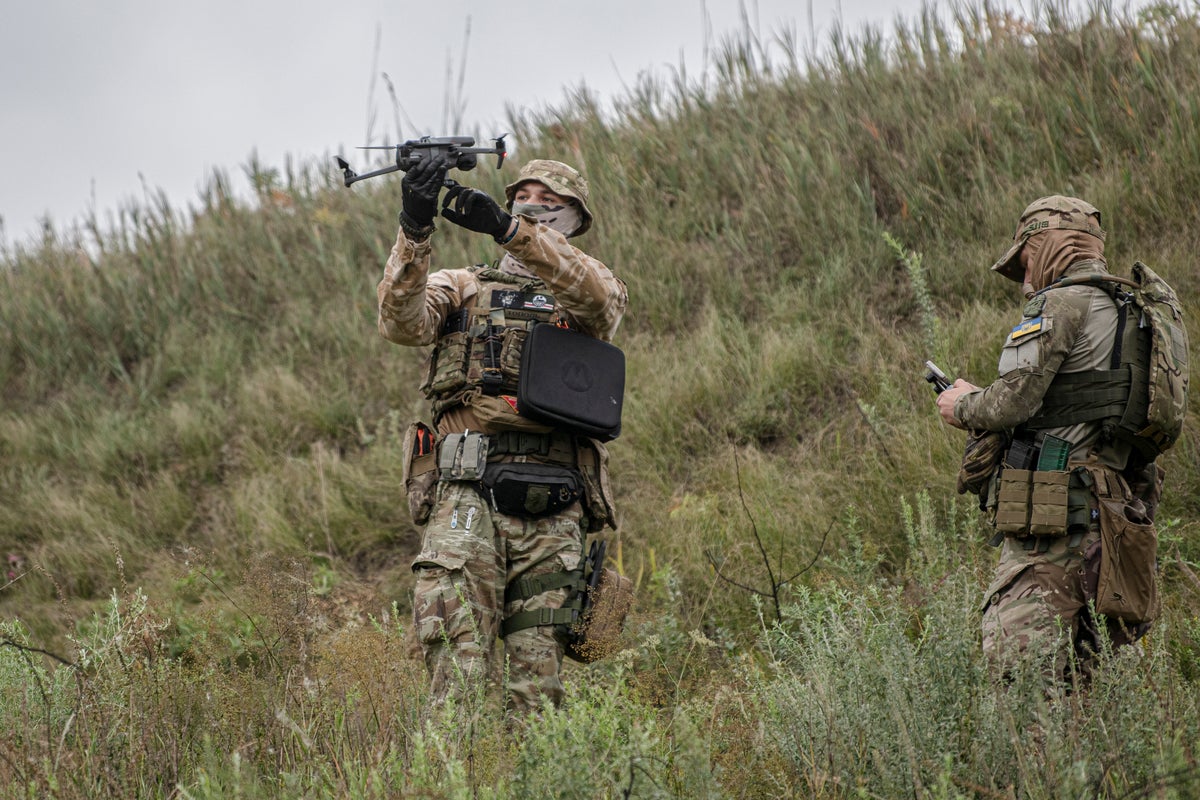
Kneeling in a patch of yellow wildflowers, a Chechen soldier carefully attaches an explosive device to the bottom of a small drone. Seconds later, it is released. It explodes next to two old storefront mannequins set up 200 meters (yards) away, one with a Russian-style military hat on its head.
After this and other training outside the Ukrainian capital, the Chechen soldiers, in assorted camouflage footwear and protective gear, will be heading to the front lines in Ukraine, vowing to continue the fight against Russia that raged for years in their North Caucasus homeland.
Fighters from Chechnya, the war-scarred republic in southern Russia, are participating on both sides of the conflict in Ukraine.
Pro-Kyiv volunteers are loyal to Dzhokhar Dudayev, the late Chechen leader who headed the republic’s drive for independence from Russia. They form the “Dudayev Battalion” and are the sworn enemies of Chechen forces who back Russian President Vladimir Putin and joined Russia in the months-long siege of Ukraine's key port of Mariupol and other flashpoints in eastern and southern Ukraine.
One group of new Chechen arrivals, many of whom live in Western Europe, was being trained at a makeshift firing range outside Kyiv before heading east. At a training session Saturday, the new recruits ‒ all Muslim men ‒ shouted “Allahu akbar!” ("God is great!"), holding their rifles in the air before being handed military ID cards that are issued to volunteers.
Ukrainian officials say the Chechen battalion currently numbers several hundred who fight alongside the country’s military but are not formally under the national command.
Instructors teach the new battalion members combat basics, including how to use a weapon, assume a firing position and how to work in teams. Trainers include veterans of wars in Chechnya that ended in 2009, some joining up in Ukraine after the fighting against Russia-backed separatists started in Ukraine in 2014.
Tor, a volunteer who asked only to be identified by his battlefield nickname, said he sees no difference between the two conflicts.
“People have to understand we don’t have a choice,” he said speaking in English and with his face covered. “If they (Russian forces) win this war, they will continue. They never stop. I don’t know. The Baltic countries will be next, or Georgia or Kazakhstan. Putin openly, absolutely, says he wants to rebuild the Soviet empire.”
Russia launched two wars to prevent Chechnya, a mostly Muslim province, from gaining independence after the 1991 collapse of the Soviet Union. The first conflict erupted in 1994.
The second Chechen war began in 1999 and culminated in a siege by Russian troops of Grozny, the Chechen capital, which was devastated by heavy Russian bombardment. After years of battling an insurgency, Russian officials declared the conflict in Chechnya over in 2017.
Muslim Madiev, a veteran fighter of the Chechen conflicts, identified himself as an adviser to the volunteer battalion in Ukraine. He joined the soldiers Saturday in shooting practice, taking aim at a plastic bottle held up on a stick. Bullet casings flew from his automatic rifle onto a field already littered with bullets, shotgun cartridges and cardboard target sheets.
“We’re going to win this war. The whole world is already standing up for us,” he says, speaking in Russian.
“We were the only ones who fought for ourselves (in Chechnya). No one stood with us. But now the whole world is behind Ukraine. We must win, we must win,” he declared. ___ Follow AP’s coverage of the war in Ukraine at https://apnews.com/hub/russia-ukraine







